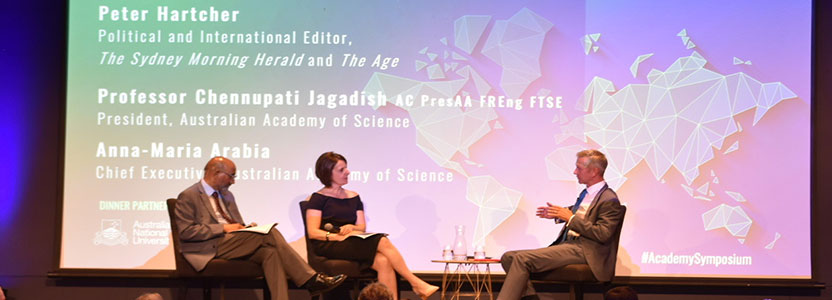
No single country will be capable of solving the problems faced by our planet-from dwindling natural resources to collapsing ecosystems, rising sea levels or the eruption of new pandemics.
But the global research system required to respond to these challenges is now at stake.
On Monday 13 November, the Australian Academy of Science held a dinner ahead of its National Symposium, to discuss how we can address national security concerns while still enabling the benefits that open scientific collaboration offers Australia and the globe.
Australian scientists have always been international collaborators-whether that's working with those coming to Australia for research or study, or while seeking assistance of scientists from other shores to help build capacity and solve our problems.
President of the Australian Academy of Science Professor Chennupati Jagadish AC pointed out that the last major Australian invention that did not involve international input was the stump-jump plough-in 1876.
And while Australia's international scientific collaborations have increased significantly over the past two decades (from 2013 - 2023, 90% of the top 50 cited papers from Australian authors in Web of Science were co-authored with overseas collaborators) the global science system is now at its most vulnerable.
"The changing geopolitics of our time is impacting the organisation and evolution of global science and international scientific collaborations like never before," Professor Jagadish said.
"There's no doubt scientists and researchers are a competitive bunch, but presenting science purely as a competition among groups or nations ignores the reality of our interconnected global science system and its international networks."
Her Excellency Ms Caroline Kennedy, Ambassador of the United States of America to Australia, spoke about the special relationship between researchers in the US and Australia.
"Thanks to the generational opportunity presented by AUKUS, our societies now have the chance to catapult to the forefront of advanced capabilities-AI, quantum and cyber. Just like the moonshot spurred scientific and technological advances-like GPS, water purification, and heart monitors 60 years ago-these new fields will also produce innovations that benefit people in their everyday lives and inspire new generations to get involved in science and to dream and create," Ms Kennedy said.
"Striking the right balance between collaborative research and national security is one of the most important and difficult goals of democratic societies like the US and Australia… we need to be clear-eyed about the risks of openness and the intent of our competitors."
Peter Hartcher, political and international editor of The Sydney Morning Herald and The Age, spoke with Australian Ambassador to the United States of America His Excellency the Hon Dr Kevin Rudd AC in Washington DC ahead of the dinner.
The Hon Dr Rudd said there have been significant diplomatic efforts on both sides of the US-China relationship, and that Australia was similarly looking to stabilise its relationship with China following a turbulent few years.
But he said the scope for scientific collaborations may vary greatly between fields of science.
"I think in the domain of space, like cyber, like quantum and like artificial intelligence, we've simply got to be realistic about where geopolitics is going to take us… I think the baseline about geopolitics just makes that far too difficult [to collaborate]," Dr Rudd said.
In the panel discussion between Professor Jagadish and Ms Arabia, moderated by Peter Hartcher, Ms Arabia elaborated on the draft Defence Trade Controls Amendment Bill 2023.
"What has come into stark reality is that the very architecture of the research system is likely to transform," Ms Arabia said.
Professor Jagadish drew on his own experiences to highlight how imperative research collaborations are to maintaining a healthy research ecosystem.
"I have 12 nationalities in my research group. Not a single person in there, including myself, is born in Australia. That is the real landscape of the Australian research environment," Professor Jagadish said.
On Tuesday 14 November, symposium attendees will hear from experts sharing data on the impacts of national security on Australia's research collaborations and compare those to measures adopted in other nations.
The discussion will seek to address: have we struck the right balance between openness in scientific research and development in Australia and risk mitigation measures designed to secure our national security?
Speakers and panelists include: Deputy Prime Minister and Minister for Defence the Hon Richard Marles MP; Australia's Chief Defence Scientist Professor Tanya Monro AC; the American Association for the Advancement of Science's Dr E. William Colglazier; Advisory Board Member of the National Foundation for Australia-China Relations Associate Professor Courtney Fung; and Chair of the Task Force on Security Issues in UK Higher Education Professor Sir Peter Mathieson.
Academy Foreign Secretary Professor Frances Separovic AO and Academy Fellow Professor Steven Chown, Director of the ARC Special Research Initiative Securing Antarctica's Environmental Future, are co-conveners of the National Symposium.






